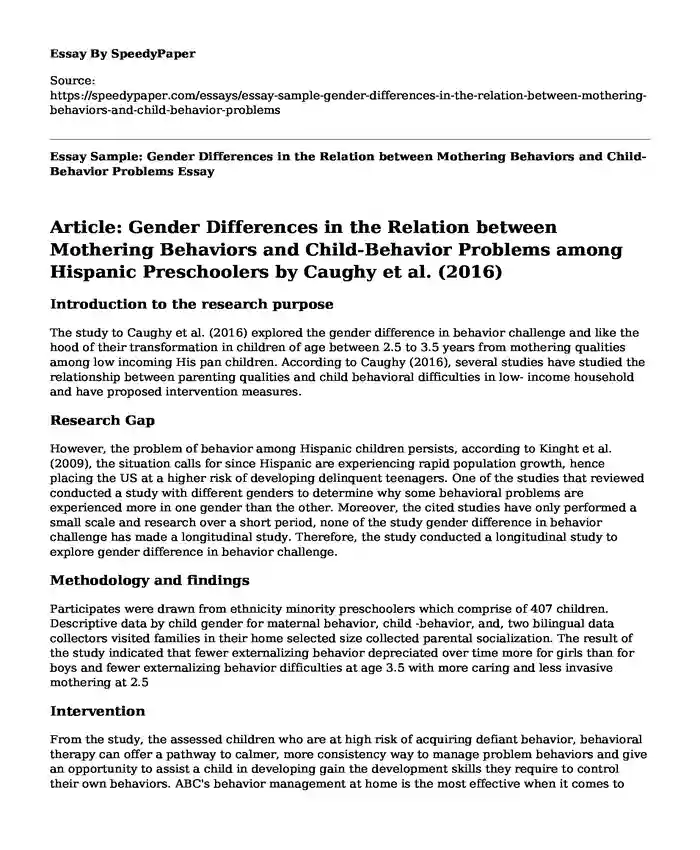
| Type of paper: | Essay |
| Categories: | Parenting Human behavior |
| Pages: | 3 |
| Wordcount: | 582 words |
Article: Gender Differences in the Relation between Mothering Behaviors and Child-Behavior Problems among Hispanic Preschoolers by Caughy et al. (2016)
Introduction to the research purpose
The study to Caughy et al. (2016) explored the gender difference in behavior challenge and like the hood of their transformation in children of age between 2.5 to 3.5 years from mothering qualities among low incoming His pan children. According to Caughy (2016), several studies have studied the relationship between parenting qualities and child behavioral difficulties in low- income household and have proposed intervention measures.
Research Gap
However, the problem of behavior among Hispanic children persists, according to Kinght et al. (2009), the situation calls for since Hispanic are experiencing rapid population growth, hence placing the US at a higher risk of developing delinquent teenagers. One of the studies that reviewed conducted a study with different genders to determine why some behavioral problems are experienced more in one gender than the other. Moreover, the cited studies have only performed a small scale and research over a short period, none of the study gender difference in behavior challenge has made a longitudinal study. Therefore, the study conducted a longitudinal study to explore gender difference in behavior challenge.
Methodology and findings
Participates were drawn from ethnicity minority preschoolers which comprise of 407 children. Descriptive data by child gender for maternal behavior, child -behavior, and, two bilingual data collectors visited families in their home selected size collected parental socialization. The result of the study indicated that fewer externalizing behavior depreciated over time more for girls than for boys and fewer externalizing behavior difficulties at age 3.5 with more caring and less invasive mothering at 2.5
Intervention
From the study, the assessed children who are at high risk of acquiring defiant behavior, behavioral therapy can offer a pathway to calmer, more consistency way to manage problem behaviors and give an opportunity to assist a child in developing gain the development skills they require to control their own behaviors. ABC's behavior management at home is the most effective when it comes to challenging behavior because it holistically approaches thy problem.
Effectiveness
ABC's behavior management approach is a three steps process that aim that maximum control and prevention of defiant behaviors (Lecavalier et al. 2017). The first step is called Antecedents; this is the first bit that requires one to learn the other factor. Discovering the cause is a significant fact helps to prevent misbehavior, then it followed by instilling of behavior; behavior entails incorporation of a particular action or behavior that one desire a child to acquire and final choosing of appropriate consequences to reinforce the desired behavior. By the end of the three-stepped process, a child will have adopted different methods to react to a situation in a positive manner
References
Caughy, M. O. B., Peredo, T. N., Owen, M. T., & Mills, B. (2016). Gender differences in the relation between mothering behaviors and child-behavior problems among Hispanic preschoolers. Developmental psychology, 52(4), 592.
Cook, A., Spinazzola, J., Ford, J., Lanktree, C., Blaustein, M., Cloitre, M., ... & Mallah, K. (2017). Complex trauma in children and adolescents. Psychiatric annals, 35(5), 390-398.
Knight, G., Roosa, M., Calderon-Tina, C., Gonzales, N. (2009). Methodological issues and research on Latino populations. In L. Zayas & J. Borrego, Jr. (eds) Handbook of U.S. Latino Psychology: Developmental and Community Based Perspectives. Thousand Oaks, CA: Sage, 45-62
Lecavalier, L., Smith, T., Johnson, C., Bearss, K., Swiezy, N., Aman, M. G., ... & Scahill, L. (2017). Moderators of parent training for disruptive behaviors in young children with autism spectrum disorder. Journal of abnormal child psychology, 45(6), 1235-1245.
Cite this page
Essay Sample: Gender Differences in the Relation between Mothering Behaviors and Child-Behavior Problems. (2022, Sep 12). Retrieved from https://speedypaper.net/essays/essay-sample-gender-differences-in-the-relation-between-mothering-behaviors-and-child-behavior-problems
Request Removal
If you are the original author of this essay and no longer wish to have it published on the SpeedyPaper website, please click below to request its removal:
- What Are General Education Competencies? The Answer in This Free Essay
- Global Warming Definition Essay Sample
- Free Essay on the Public Education System in the United States
- Positive Human Rights Violations among UN Members States - Research Proposal Paper Sample
- Free Essay Example: Summary of Hadrami Diaspora
- Free Essay about the Research Conducted on the Importance of Taking Time to Celebrate
- Free Essay Example - Becoming a Nurse Practitioner
Popular categories




